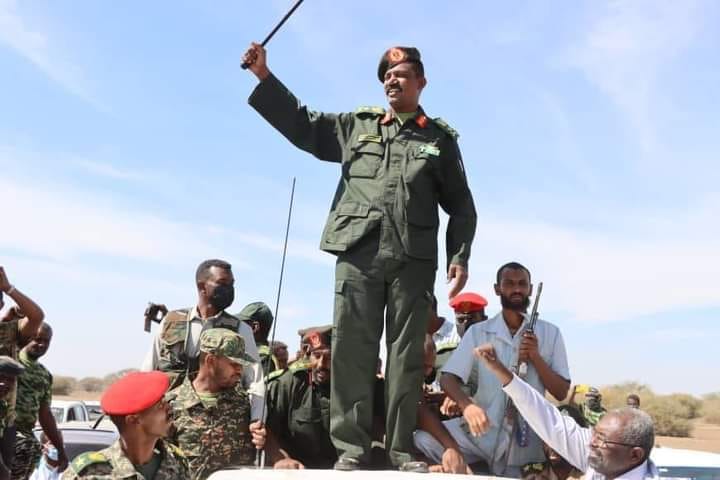Central Sudan’s new armed group of Al-Butana region
December 22, 2022 (KHARTOUM) -The establishment of the Sudan Shield Forces (SSF) in the central Sudan area of Al Butana poses several questions about the group, the timing and who stands behind it.
What is the truth of the second armed group that emerges in Central Sudan while other Darfurian groups threaten to return to war?
Speaking at a military parade for his forces on December 17, the SSF leader and former Sudanese army officer Abu Aklah Mohamed Ahmed Kikel voiced their opposition to the Juba Peace Agreement. Also, he asserted their readiness to defend central Sudan from the domination of any other parties trying to control it and exploit its resources, in a veiled reference to the Darfur armed movements.
Why the SSF
Following the fall of the former regime, Kikel sought to reach out to the then-ruling coalition Forces for Freedom and Change (FFC) as an activist representing the Free Al-Butana Platform, a civil society group concerned with public affairs in the region.
However, their efforts were not productive. Kikel only met with the Sudan Liberation Movement leader Minni Minnawi when he was touring central and eastern Sudan on December 29, 2020, after the signing of the peace agreement. He agreed with the Darfuri leader to develop relations but there was no further development.
Youssif Amara Abu Sin, the Spokesman of the platform said that their failure to bring the political forces and peace signatories to pay attention to their local issues pushed them to follow the example of the Darfurian groups.
“Kikel proactively sought to establish contact with the FFC to build understandings between the Platform and those political groups, but his efforts were not crowned with success. This failure convinced Kikel and his group that political action is useless,” Abu Sin stressed.
The group leader, for his part, put out two reasons for the establishment of the new armed group in central Sudan: the insecurity in the country with the spread of armed groups and the injustice against their region.
“The current situation dictated the establishment of this force (SSF) to maintain security and restore the strategic balance in the country, under the Juba agreement which unfairly dealt with the central, northern and eastern Sudan,” Kikel told his forces on December 17, 2022.
In February 2021, he had already spoken about their political demands in a public meeting when he called to represent their region in the collegial presidency, the Sovereign Council, the transitional government and the armed forces.
“If we do not obtain our rights in a peaceful manner, we will obtain them by arms,” warned the former military officer.
Recruitment by armed groups
According to the spokesman Abu Sin, the platform was also angered when they saw the western Sudan former rebel groups visiting their region seeking to recruit new members for their movements as they prepare to run for elections at the end of the transitional period as national political forces. Several signatories have no influence in the Darfur region due to the strong tribal impact there.
In a speech he delivered in a meeting held by the Butana Forum after distributing humanitarian aid to those affected by the floods in Wad Rawa area in August 2021, Kikel complained about what he called the “indiscriminate recruitment” operations carried out by some armed movements in the Butana region.
“We do not accept that delegations come to us every day to recruit our sons. People from Darfur should not come to recruit us, deceive our people with empty (military) ranks and manipulate our youth, this is unacceptable”.
“We do not need to be recruited by these parties, we are ready with fighters, arms, enthusiasm and determination, but for ourselves, we will not be dependent on anyone,” he stressed.
In spite of all these rationales, there were many questions about the emergence of this group weeks after the formation of another central Sudan group led by former army officers calling to cancel the Juba peace agreement.
Alswarmi, Kikel the same agenda
On November 13, 2022, a group of retired officers held a press conference in Khartoum to declare the establishment of an armed movement under the name of “the Homeland Entity”. The formerly Sudanese army spokesman and the military commander of the group Alsawarami Saad stated that they want the cancellation of the Juba peace agreement and to protect the interests of the people of greater central Sudan from the Red Sea to Kordofan.
At the time, some former military officers posed the probability that Alsawarmi was implementing a plan set by the military intelligence, to manage the political crisis in line with al-Burhan’s speech before the Sudanese troops during his successive visits to the military bases.
In addition to calls to end the peace agreement, the Al-Butana group and the Homeland Entity have the same discourse toward the Sudanese army: we are not in a war against the army.
A member of the SSF Command Walid Al-Shobali told Sudan Tribune that the Sudanese army is not their enemy.
“People feel marginalized and insecure under the multiplicity of armies in the country. There are more than 70 militias. When someone says that violating the Juba Agreement means returning to war, this is a threat to the national security,” he said.
Military analysts warn against such militias, saying they arise in support of the army, but they quickly turn against it and develop their own agenda.”
“These militias will turn against the army, as did the disbanded Operations Units of the National Intelligence Security Services, and as the Rapid Support Forces today represent the greatest threat and danger to the Sudanese army,” said Omer Arbab a retired general.
(ST)

